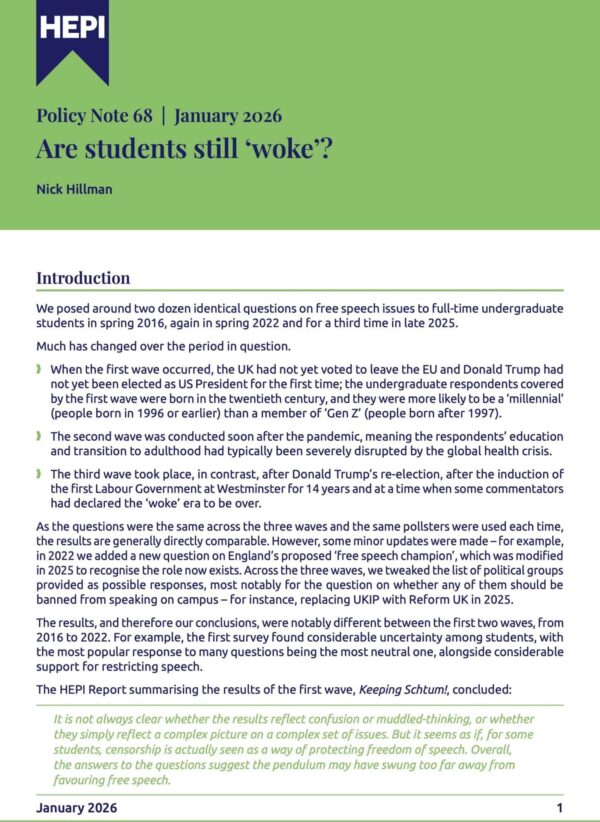After a Dip in 2024, are UK International Student Visas Poised to Return to their Previous Peak?
The blog below has been kindly written for HEPI by Justin Wood, UK Director at ApplyBoard (X: @ApplyBoard).
Over the spring Bank Holiday weekend, HEPI published ‘Overstretched and under-resourced’? UK higher education on the cusp of the Spending Review by Nick Hillman.
Policy changes in 2024 reshaped the UK’s international education landscape, leading to significant shifts in student mobility. The Sunak government’s restrictions on student dependents immediately impacted applicants from key source markets where family migration is a priority. At the same time, rising fees and uncertainty around the Graduate Route (now resolved) added further pressure that dampened demand.
Main Applicant Demand Declined by 12% in 2024
The UK has long been a leading destination for international students, with visa applications peaking in 2022 at nearly half a million main applicant submissions. This high point was partly driven by post-pandemic disruptions to global student mobility. Applications dipped slightly in 2023 as demand stabilised and the Sunak administration’s rhetoric signalled a less welcoming environment for non-EU students. By 2024, application volumes saw a sharp decline:
More than 423,000 sponsored study visas for main applicant international students were processed in 2024. This represents a 12% decline from the previous year and a 15% drop from the 2022 high-point. While this drop was more mild than student visa decreases seen in other destinations in 2024, it still accounts for nearly 60,000 fewer processed applications in a single year.
Withdrawn applications further reflect softened student demand, likely influenced by policy changes. Nearly 6,600 prospective students withdrew their application in 2024, a 127% increase from the previous year. This followed a sharp rise in Q4 2023, when withdrawals spiked to 2,000—366% higher than Q4 2022. In short, after a wave of unwelcoming messaging from the Sunak administration in mid-to-late 2023, fewer international students applied, and withdrawals hit record highs.
However, there are signs of possibly renewed student confidence. Nearly 63,000 UK study visa main applications were processed in Q4 2024. This represents a growth of 9% over Q4 2023.
Demand Fell Most Sharply in Markets Where Students Commonly Travel With Family
The most significant drops in UK study visa demand in 2024 came from countries where international students often apply with dependants:
Main applicant numbers fell in 2024 across seven of the ten countries with the highest ratios of dependants to main students, underscoring the impact of the new restrictions. Yet not all high-dependant markets followed this trend. Applications from Nepal rose sharply, increasing by 61%, while volumes from Pakistan and Bangladesh held steady.
Does this mean concerns about the new policy were overstated since not all high-ratio student populations saw declines? Not quite. The seven countries that experienced declining interest—Nigeria, Sri Lanka, Ghana, Iran, Afghanistan, Saudi Arabia, and India—accounted for seven of the eight largest main applicant declines last year, with Russia (-21%) slightly surpassing Saudi Arabia.
Where Did Student Demand for a UK Study Visa Remain Resilient in 2024?
Beyond these declines, which student populations showed increased demand in 2024? The table below highlights the top 10 student populations that saw growth in 2024:
Nepal and Pakistan emerged as notable exceptions to the broader decline among countries with high dependant-to-student ratios—not just for bucking the trend, but for the scale of their growth. Nepal saw the sharpest year-over-year increase of any market in 2024, with main applicant volumes surging by 61%. Pakistan followed closely behind, ranking fourth overall with an 11% rise. Their resilience suggests that factors beyond dependant policies—such as economic conditions, domestic education capacity, and long-term aspirations for post-study work—continue to shape student decision-making.
Beyond Nepal and Pakistan, growth was more geographically dispersed in 2024. Kenya and Myanmar (Burma) recorded some of the largest increases, signaling rising demand from parts of both Africa and Southeast Asia. Several European countries, including Germany, Switzerland, and Italy, also posted moderate gains. Meanwhile, the presence of Mexico and Kazakhstan among the top 10 growth markets highlights the increasingly global nature of student mobility to the UK.
Just beyond the top 10, Kuwait and Turkey also recorded notable increases in main applicant volumes. As institutions navigate a shifting recruitment landscape, both countries may present important opportunities for future engagement and growth.
Looking Ahead
The UK’s international education sector faced considerable challenges in 2024, with policy changes reshaping student mobility patterns. At this stage—and despite calls from some in the sector—we don’t anticipate imminent steps to reverse the dependent policy, nor do we think it’s likely that the Government will opt to take international students out of the net migration figures. That said, we’ve already seen a much more positive message coming from the Government towards international students and we expect this to be sustained and reflected in the launch of the new International Education Strategy.
It’s also important to note that the UK was not the only destination to experience softened student interest in 2024, as international education sectors in Canada, the US, and Australia all faced declines. Encouragingly for the UK, many institutions reported higher enrolments in this year’s January intake than in the same time last year, indicating positive momentum. Now is the time to build on that progress.
To sustain this momentum, UK institutions will need to actively re-engage prospective students and rebuild confidence in key markets. Clear communication around post-study work opportunities, financial aid, and student support will be essential to reassuring applicants. At the same time, growing interest from countries such as Kenya, Myanmar, Kuwait, and Mexico presents an opportunity to strengthen recruitment efforts and establish a more diverse student base.






Comments
Lloyd Williams says:
A hint of positivity that based on some news this morning about further restrictions https://www.bbc.co.uk/news/articles/cn0wd75ne82o may lead this into the one step forward, two steps backward camp?
Reply
Add comment